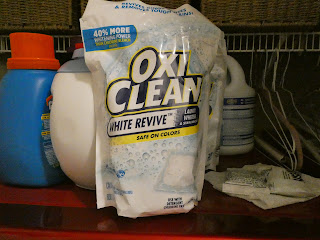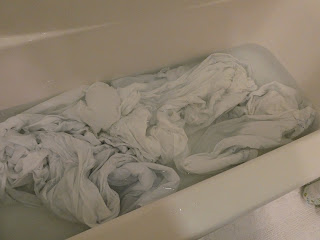Cleaning out a home after a death is a sad and nostalgic task. When my mother-in-law recently passed away in Spain, we had to sort out everything in her apartment. We had to give away or throw away many item. My husband brought home only a few items from her apartment. He was not able to bring much because he could only bring what fit in his suitcases (and he paid for two extra suitcases). Some of those items were fragile (crystal glasses) and some were heavy (books) that needed padding so they wouldn't shift or break, so he wrapped them in the heirloom linens we found in the closet. Several generations of my mother-in-law's family owned this apartment.
It turns out that these linens were quite beautiful, but a bit dingy from being stored a long time. Some looked brand new as if they were never used. I think the dry climate in Spain helped preserve them from mold or mildew spots. I researched a bit on how to restore these handmade, delicate items. We decided that we were probably going to use some of them, but my daughter and I didn't want all of them. Here is what I did to clean and store them:
The advice was to not use anything harsh like bleach or detergent. I soaked them for several days in a bathtub filled with warm water and Oxy-clean. This brightened up the linens and was not caustic. Most of them were not stained, fortunately, just dingy from storage. The water turned yellow from the years of dust, so I changed the water daily that the linens were soaking in.
To rinse them I used the hand held shower wand in the bathroom with warm water, and then put them through the short rinse only cycle in the washing machine. This step would be skipped if the items were especially fragile, but most of what we had was in excellent shape and quite sturdy, even though we figured some of them were over 100 years old.
Some of the items like tablecloths and bedding I ironed on medium heat while they were still damp. They came out beautiful. This step could be skipped for very delicate items, or lacy doilies.
An embroidered hanky!
Lace and crocheted items were air dried, some flat, and some on a drying rack
A very delicate hanky! It was so fine you could see through it!
An embroidered bedsheet
I spent several days washing, sorting, rinsing, drying and ironing dozens of pillow cases, napkins, bedding, and tablecloths. I decided to keep only a few. I really don't want these items to just end up stored in a closet for another 100 years. I'm keeping just what I will use - a few hankies, some beautiful napkins, and some smaller items. The rest I will share with my daughter, and then we will give away or sell the rest. I know that linens are not valuable or costly, but it seems a shame to just toss them or continue storing them.
Here is the mystery. Some of the items are embroidered with "C M", which was my husband's grandmother's monogram - Maria Consuelo Martin (1908 - 2001) she was married in 1933 in Villar de Ciervo, Salamanca, Spain, so she probably made a lot of these before her marriage. Her mother was Josefa Rivero (1884 - 1937), married in 1904 also in Villar de Ciervo, and some of these items came from her marriage. There are also sheets and pillowcases with a mystery monogram (see below). Maybe this is not a monogram? Is it just an abstract design? Perhaps it is a design for the letter "G", which was Consuelo's husband (Jose Garcia (1908-1954))? It could be an "S" for Jose's father Sebastian Garcia (1878-1962)?
Temporary storage for the clean linens.
For long term storage I would recommend acid free materials.
----------------------------------
To cite/link to this blog post: Heather Wilkinson Rojo, "Several Generations of Linens and Lace from Spain", Nutfield Genealogy, posted October 24, 2023, ( https://nutfieldgenealogy.blogspot.com/2023/10/several-generations-of-linens-and-lace.html: accessed [access date]).


.JPG)
.JPG)
.JPG)
.JPG)













.JPG)
.JPG)
.JPG)
.JPG)
.JPG)
.JPG)
.JPG)


















.jpg)


.jpg)


